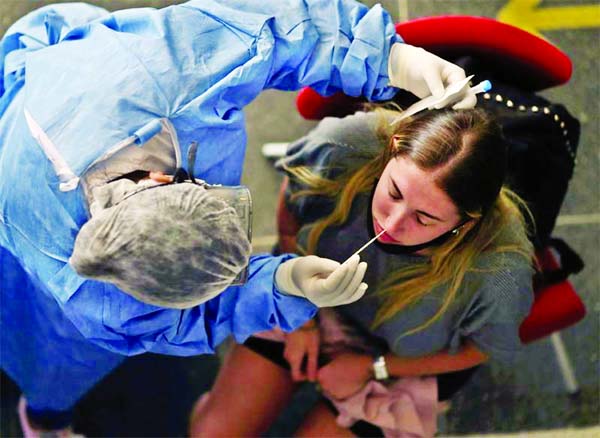
Reuters, London :
People who have had COVID-19 are highly likely to have immunity to it for at least five months but there is evidence that those with antibodies may still be able to carry and spread the virus, a UK study of healthcare workers has found.
Preliminary findings by scientists at Public Health England (PHE) showed that reinfections in people who have COVID-19 antibodies from a past infection are rare – with only 44 cases found among 6,614 previously infected people in the study.
But experts cautioned that the findings mean people who contracted the disease in the first wave of the pandemic in the early months of 2020 may now be vulnerable to catching it again.
They also warned that people with so-called “natural immunity” – acquired through having had the infection – may still be able carry the SARS-CoV-2 coronavirus in their nose and throat, and could unwittingly pass it on.
“We now know that most of those who have had the virus, and developed antibodies, are protected from reinfection, but this is not total and we do not yet know how long protection lasts,” said Susan Hopkins, senior medical adviser at PHE and co-leader of the study, whose findings were published on Thursday.
“This means even if you believe you already had the disease and are protected, you can be reassured it is highly unlikely you will develop severe infections. But there is still a risk you could acquire an infection and transmit (it) to others.”
A statement on the study said its findings did not address antibody or other immune responses to vaccines now being rolled out against COVID-19, or on how effective vaccines would be. Vaccine responses will be considered later this year, it said.
The research, known as the SIREN study, involves tens of thousands of healthcare workers in Britain who have been tested regularly since June for new COVID-19 infections as well as for the presence of antibodies.
Between June 18 and Nov. 24 scientists detected 44 potential reinfections – two “probable” and 42 “possible” – out of 6,614 participants who had tested positive for antibodies. This represents an 83% rate of protection from reinfection, they said.
People who have had COVID-19 are highly likely to have immunity to it for at least five months but there is evidence that those with antibodies may still be able to carry and spread the virus, a UK study of healthcare workers has found.
Preliminary findings by scientists at Public Health England (PHE) showed that reinfections in people who have COVID-19 antibodies from a past infection are rare – with only 44 cases found among 6,614 previously infected people in the study.
But experts cautioned that the findings mean people who contracted the disease in the first wave of the pandemic in the early months of 2020 may now be vulnerable to catching it again.
They also warned that people with so-called “natural immunity” – acquired through having had the infection – may still be able carry the SARS-CoV-2 coronavirus in their nose and throat, and could unwittingly pass it on.
“We now know that most of those who have had the virus, and developed antibodies, are protected from reinfection, but this is not total and we do not yet know how long protection lasts,” said Susan Hopkins, senior medical adviser at PHE and co-leader of the study, whose findings were published on Thursday.
“This means even if you believe you already had the disease and are protected, you can be reassured it is highly unlikely you will develop severe infections. But there is still a risk you could acquire an infection and transmit (it) to others.”
A statement on the study said its findings did not address antibody or other immune responses to vaccines now being rolled out against COVID-19, or on how effective vaccines would be. Vaccine responses will be considered later this year, it said.
The research, known as the SIREN study, involves tens of thousands of healthcare workers in Britain who have been tested regularly since June for new COVID-19 infections as well as for the presence of antibodies.
Between June 18 and Nov. 24 scientists detected 44 potential reinfections – two “probable” and 42 “possible” – out of 6,614 participants who had tested positive for antibodies. This represents an 83% rate of protection from reinfection, they said.

